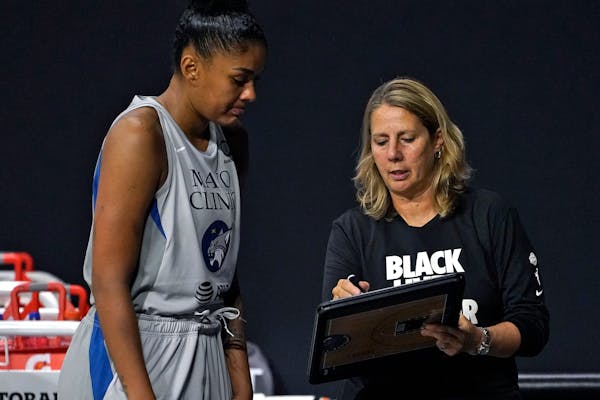Almost as soon as the news broke of Alex Rodriguez and Marc Lore negotiating to take over the Timberwolves and Lynx, the pessimistic reaction on social media ranged from "Will they move the Wolves?" to "How long before they move the team?"
There is a segment of the fan base that has wanted Taylor to sell the Wolves because of a lack of playoff success, but Taylor's ownership always has meant the Wolves weren't leaving for another city.
Part of Taylor's succession plan was always to sell to a party that wanted to keep the Wolves in Minnesota, but the questions now are: How can he enforce that? Is there a chance the Wolves will move?
The answers are complicated, but in the end — even years after Taylor isn't the owner — the NBA might well be the backstop that keeps the Wolves in the 14th-largest media market in the country.
Taylor has told the Star Tribune and other media outlets that there is language in the contract with Rodriguez and Lore to keep the team here. Legal experts told the Star Tribune that such language, or a covenant, can be tricky to enforce as it relates to moving a business.
"I'm sure there could be a provision that relates to keeping the team in place," said Eldon Ham, an author and professor of sports law at Chicago-Kent College of Law. "But I don't think it would be able to extend forever."
Nor could it be overly punitive, Ham said, or else a court might throw it out. The major penalty any owner would have to pay for moving the Wolves is $50 million to the city of Minneapolis for breaking Target Center's lease, an agreement that runs through 2035.
That's a drop in the bucket considering Rodriguez and Lore are paying $1.5 billion for the teams. If they want to move, what's another $50 million?
However, in an interview with WCCO, Taylor said ultimately the NBA has to approve a move and the league does not want to see the Wolves in another market.
"The NBA will not approve of the Timberwolves moving from here to Seattle," Taylor said. "It's in the NBA's interest that in Seattle, that a new team is formed. It's an economic decision that's in the interest of all of the owners."
By that, Taylor means the other owners stand to make a handsome expansion fee if new teams pop up in Seattle or Las Vegas. Immediately, Wolves fans flashed back to when the Seattle SuperSonics bolted for Oklahoma City in 2008. The two situations aren't perfectly analogous, starting with the fact that it only cost Thunder owner Clay Bennett $30 million to move the team, according to reports at the time.
Taylor said such a fee to move the team could be much higher, even approaching $2 billion, and that would disincentivize a move.
That leads to another question: Could the NBA actually enforce such a high move price?
Ham said it was doubtful they could for as much money as Taylor is suggesting.
"If I were in the A-Rod group and I wanted to move it and the NBA did sort of have a transfer fee that's more than the team is worth, I would say it oversteps the league's authority and it's arbitrary and unreasonable," Ham said.
Even if the transfer fee was for a lower amount, the question could still be: How high is too high?
The NBA might set an unreasonably high transfer price so theoretically it could say it isn't preventing the move, but makes it practically impossible.
Even though the NBA is a private association and not subject to due process, Ham said, it still is bound by "fundamental fairness," or in other words, "They can't make things up as they go as it affects people's rights."
A legal battle might ensue in such a situation. But there's another angle to this, Ham said.
"If they did buy it because they wanted to move, I think they would've felt that out before taking on maybe a recalcitrant NBA and a lawsuit and all the rest," Ham said.
In other words, if the league wants the Wolves to stay in Minnesota, why buy the team, then go through the hassle of trying to move it against the league's wishes, especially if there's a chance to just own one of the expansion franchises that might be coming down the pike?
"I'd imagine they felt this out somewhere along the way," Ham said.
Ham also said the NBA isn't likely to just rubber stamp a move that takes a team away from a top-15 media market. Even though the Wolves have the reputation as the frozen outpost of the NBA where losses pile up like snowdrifts, if the Wolves ever did start winning, this perception that the team might move could quickly diminish, making all of this worry seem silly.
Or, perhaps, Rodriguez and Lore don't have any designs to move the team.
"We could be barking up the wrong tree," Ham said. "They might just keep it there anyway."
Chris Hine covers the Wolves and the NBA for the Star Tribune. chris.hine@startribune.com Twitter: @ChristopherHine





![Naz Reid (11) of the Minnesota Timberwolves Wednesday, March 27, 2024, at Target Center in Minneapolis, Minn. ] CARLOS GONZALEZ • carlos.gonzalez@](https://arc.stimg.co/startribunemedia/TGYNEKQCYNH5VEPCXSJODRMDDM.jpg?w=75&h=75&fit=crop&crop=faces)


